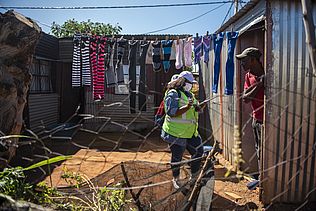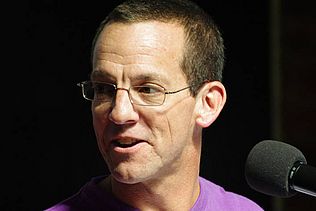At the annual Poverty and Health Congress, Lydia Cairncross described the impact of the Covid-19 pandemic in South Africa, a country that has long and harsh experience with the HIV/AIDS crisis, the deadly threat of which has been denied by former President Thabo Mbeki. This time, the reality of the pandemic was not ignored, but the crisis policies of the South African government had other consequences: The crisis did not shatter normalcy in the country; rather, normalcy is already the crisis. In particular, the pandemic reveals the pitfalls of the post-apartheid health care system in South Africa. For example, the crisis is hitting the Black population, which is much harder hit by poverty. So does the lockdown enforced by 70,000 soldiers. Black South Africans in particular were affected by police violence, with arrests and killings. In the townships, the microeconomies were drained, and day laborers, who financed themselves and their families by moving from one place to another depending on the availability of work, lost their incomes.
"On the one hand, we have a government that recognized the seriousness of the situation, and on the other hand, a social breakdown emerged that built on decades and centuries of poverty and inequality," Cairncross said.
In contrast, there is a long tradition of political and social struggle that has been shaped by South Africa's strong civil society, which represents the interests of poor and marginalized populations. At the beginning of the pandemic, the C19 Coalition was formed out of these networks, consisting of 310 groups across the country. The greatest strength of this coalition lies in its mutual, cross-community support. The mobilization and networking of activists takes place mainly online, but not only: pickets in front of the embassies of rich countries and the headquarters of large pharmaceutical companies, for example, took the protest against the blockade of the TRIPS waiver by the European Union and the German government to the streets. Outside the online meetings the activists did many community trainings face to face in small groups of 10 to 15 to teach COVID safety measures and vaccine literacy.
The Coalition gives a voice to those hardest hit by Covid-19 in South Africa. This is sorely needed, as the government, meanwhile, was busy at the front justifying itself over thefts of protective equipment and corruption scandals that undermined confidence in its work. After all, South Africa's government was one of the first countries in the world to stress the importance of equitable global distribution of Covid-19 vaccines and, together with India, brought the proposal to suspend patents on Covid-19 vaccines, medicines and protective equipment to the WTO. The U.S. announcement of support for the TRIPS waiver (at least on vaccines) in early May is a major success for South African and global civil society, but it does not end there. Lydia Cairncross points out that South Africa itself has no capacity to produce vaccine on its own, even if patent protection were lifted.
Cairncross is also sceptical of her own government in the face of corruption: "We defend a centralized purchase of the vaccine because we want a centralized program for the whole nation, but on the other hand, we criticize the speed at which this program is going, especially the transparency and accountability behind this plan, which is practically non-existent." In contrast, she said, there needs to be a democratic restructuring of access to vaccines and medical care in the country. In addition, Cairncross stressed that the conditions of best possible health could not be created if other factors were left out, such as ensuring safe transport systems, jobs, hygienic conditions, water supply, etc. "There are still a lot of people in South Africa who have to live without running water, so it's useless saying ‘keep distance’ and ‘wash your hands’. That's not feasible," Cairncross said. More attention needs to be paid to the interests of marginalized groups. In conclusion, Cairncross noted:
"As a civil society movement, we need to make sure that we build an alternative power structure that is not only supported by health professionals, but also by trade unions, health workers, women's organizations and students, the civil society organizations that are flourishing in South Africa right now. They are the glimmer of hope that we can overcome the pandemic and perhaps become another country in another world.”




